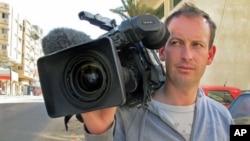The death of French television reporter Gilles Jacquier in Syria adds to a mounting toll of journalists killed, detained and attacked as they try to cover the year-old Arab Spring uprising. According to watchdog group Reporters Without Borders, the Middle East was the most dangerous region for journalists last year.
France has demanded a full investigation into the death of France 2 TV's Jacquier, who became the first western journalist killed in Syria since the anti-government uprising began 10 months ago. Unlike many journalists, who have tried to sneak into Syria without a visa, the 44-year-old Jacquier had traveled to the Syrian town of Homs with government permission. He was killed by rocket fire as he covered a pro-government rally.
Praise has poured in for Jacquier, a veteran war correspondent who had covered the conflicts in Iraq, Afghanistan, Congo and the Balkans, among others. In a broadcast interview, France Televisions Information Director Thierry Thuillier called him a real professional, a pugnacious reporter who counted many friends among his colleagues.
Jacquier adds to a mounting toll of journalists killed, attacked and detained while covering the Arab Spring uprising. Paris-based watchdog group Reporters Sans Frontieres [Reporters Without Borders] estimates 20 journalists were killed and 553 were attacked and threatened in the Middle East in 2011 - the highest numbers of any region.
"What at least has been common among all the Arab uprisings since last year is that all the regimes tried to control the flow of information," said Soazig Dollet, who heads RSF's Middle East and North Africa bureau. "They all tried to …organize a blackout regarding first the demonstrations and the protests - and the repression of those protests - by attacking local media and by preventing foreign journalist to enter."
Dollet said Jacquier becomes the fourth journalist killed in Syria since the uprising there began. Like the French government, RSF is calling on Syria's regime to fully investigate how he died.
"We're not asking foreign journalists not to go to Syria. The world needs information about what's going on in Syria. Not going to Syria means that we will play the regime's game. We need on-the-ground foreign journalists. They're the only independent source of information to understand what's going on in Syria," said Dollet.
Journalists also were killed in covering the uprisings in Yemen, Libya, Egypt and during Tunisia's relatively peaceful revolution a year ago.
| Join the conversation on our social journalism site - Middle East Voices. Follow our Middle East reports on Twitter and discuss them on our Facebook page. |




